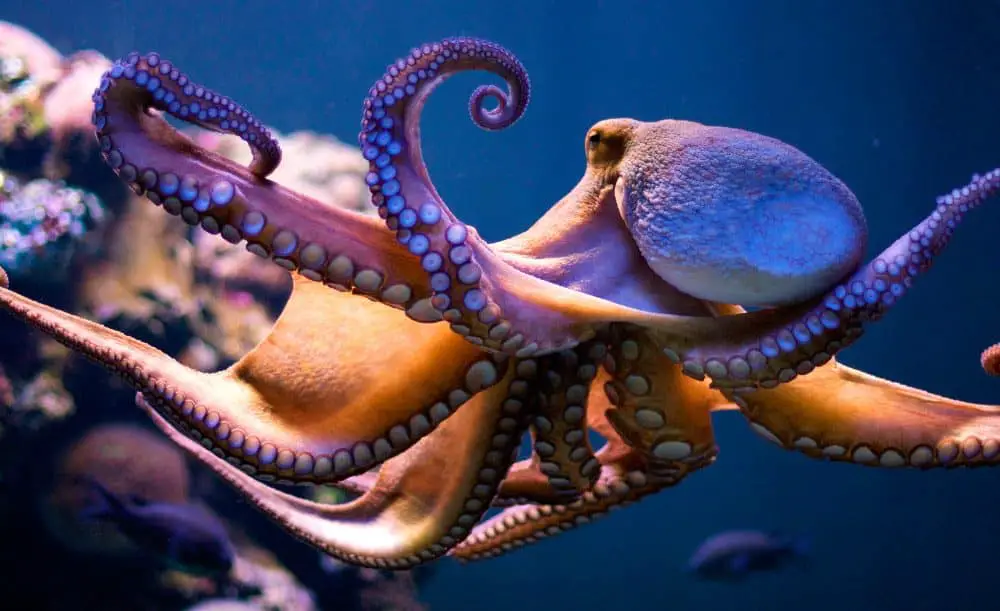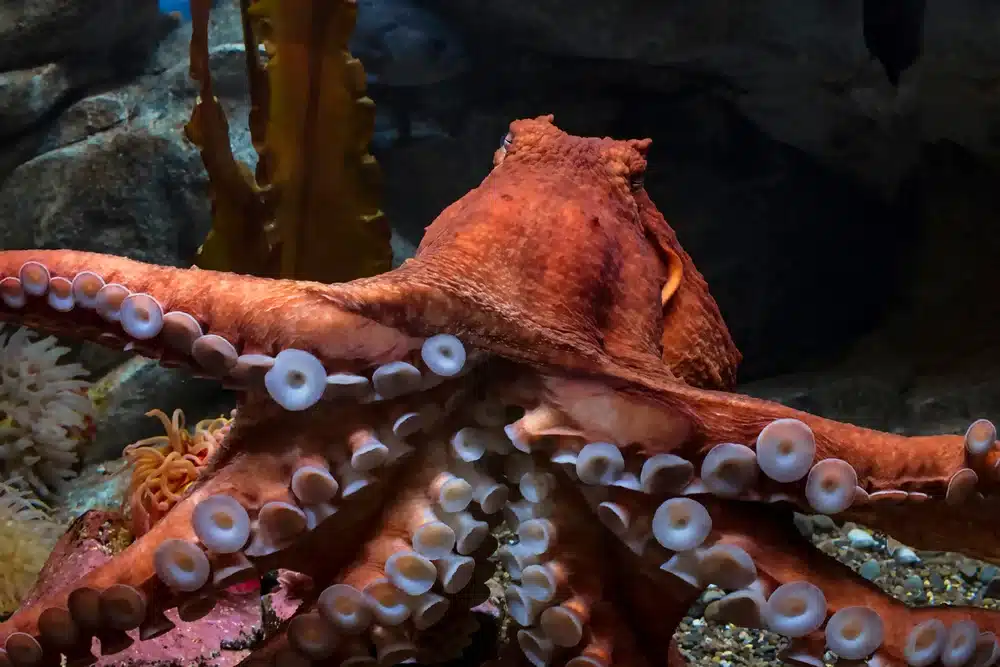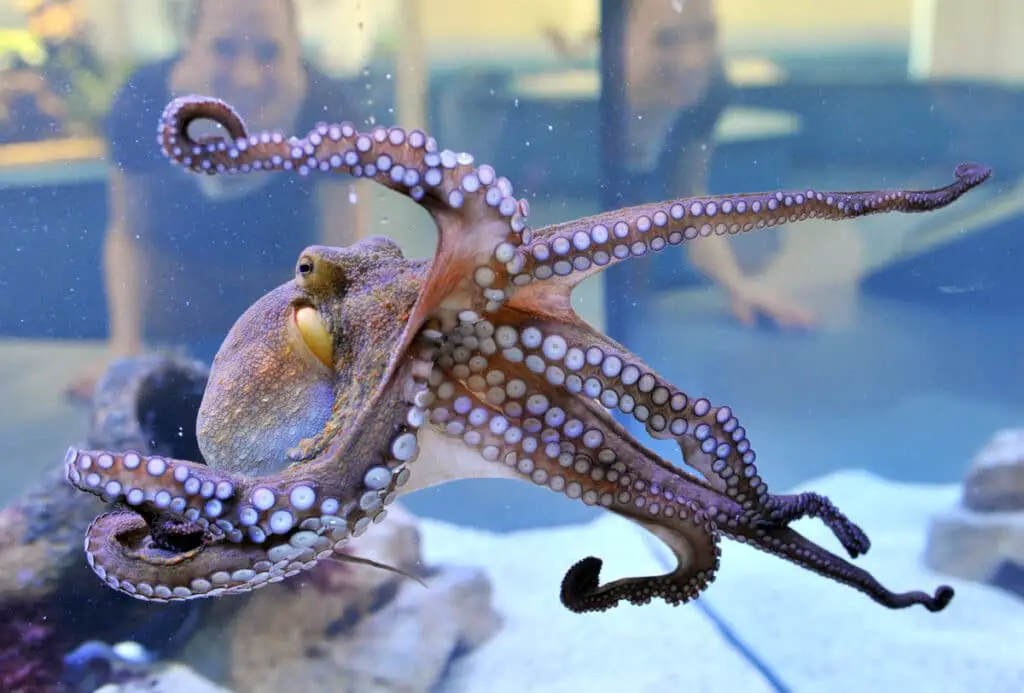Are Octopus Nocturnal

Introduction
Are Octopus Nocturnal: The enigmatic and fascinating world of octopuses has long intrigued scientists and nature enthusiasts alike. One of the intriguing aspects of these marine creatures is their activity patterns, particularly the question of whether octopuses are primarily nocturnal. Octopuses are members of the class Cephalopoda, a group of highly intelligent, soft-bodied marine animals that includes squids and cuttlefishes.
The notion that octopuses are predominantly nocturnal has gained traction due to observations made by marine biologists and divers who have encountered them during night dives. Octopuses often display heightened activity levels and emerge from their hiding spots under the cover of darkness, leading to the belief that they are primarily nocturnal creatures. However, to fully understand their activity patterns and the extent to which they exhibit nocturnal behavior, a comprehensive examination of octopus behavior, biology, and environmental factors is required.
We will delve into the world of octopuses to unravel the mystery of their activity patterns, specifically addressing whether they are indeed nocturnal creatures. By examining their anatomy, physiology, and behavior, we hope to shed light on the captivating and intricate lives of these marine marvels, as well as the ecological significance of their activity patterns in the ocean’s ecosystems.

Are octopuses nocturnal or diurnal?
Generally nocturnal, giant Pacific octopuses move about and do their hunting at night. They use their arms, each covered with approximately 200 suckers, to find and hold their prey.
The activity patterns of octopuses have long been a subject of fascination and inquiry among marine biologists and naturalists. While the question of whether octopuses are primarily nocturnal or diurnal may seem straightforward, the answer is more complex than a simple classification. Octopuses are known for their remarkable adaptability, and their activity patterns can vary based on various factors, including species, habitat, and individual behavior.
In general, many octopus species exhibit a preference for nocturnal activities. They often emerge from their dens and become more active during the cover of night, which can be attributed to reduced predation risk and the opportunity to hunt under the veil of darkness. However, this nocturnal behavior is not universal, and some octopus species are known to be more active during daylight hours, particularly in shallower waters where the intensity of light penetration allows them to thrive.
Ultimately, the activity patterns of octopuses are a reflection of their ability to adapt to their surroundings, and these intelligent cephalopods do not strictly adhere to a nocturnal or diurnal lifestyle. Instead, they showcase a remarkable capacity to adjust their behavior to optimize their chances of survival and reproduction in the ever-changing underwater world.
Why do octopus come out at night?
Octopuses can come ashore. During short nocturnal forays at low tides, a few coast-dwelling species appear to hunt for easy pickings such as crabs and shellfish.
Octopuses, those mysterious and highly intelligent cephalopods, exhibit a penchant for nocturnal activities for several compelling reasons. One primary motive behind their nighttime ventures is a strategic response to predation risks. Octopuses have numerous predators, including larger fish, sharks, and even other cephalopods.
By emerging from their hiding spots and becoming more active under the cover of darkness, octopuses can reduce their vulnerability to diurnal hunters. The darkness of night serves as a protective cloak, allowing them to evade these daytime threats.
Additionally, the darkness of night provides octopuses with a tactical advantage for hunting. Many of their prey species, such as crustaceans and small fish, are themselves more active at night. Octopuses possess excellent night vision, which aids them in locating and capturing prey under low-light conditions. Their ability to change color and texture allows them to blend seamlessly into the nighttime environment, enhancing their stealthy approach during hunting forays.
The cooler temperatures of the night may offer octopuses a more favorable environment for their metabolic processes, as they tend to be sensitive to temperature fluctuations. This, in turn, could contribute to their preference for nocturnal activities.
Octopuses venture out at night as a survival strategy, capitalizing on reduced predation risks, improved hunting opportunities, and potentially more favorable environmental conditions. Their ability to adapt their behavior to the rhythms of the underwater world showcases the remarkable intelligence and versatility of these captivating marine creatures.
Do octopus eat at night?
They typically hunt at night, pouncing on their prey and wrapping it in the webbing between their arms. They penetrate hard-shelled prey with their beaks.
Octopuses often prefer to hunt and eat at night. These intelligent cephalopods exhibit a nocturnal feeding behavior for several compelling reasons.
Firstly, many of the octopus’s preferred prey species, such as small fish, crustaceans, and mollusks, are also more active during the night. By hunting under the cover of darkness, octopuses can take advantage of the increased availability of their preferred food sources.
Octopuses possess excellent night vision, thanks to their highly developed eyes, which are adapted for low-light conditions. This superior vision allows them to locate and capture prey with precision in the dimly lit underwater environment.
Additionally, octopuses’ camouflage abilities play a crucial role in their nighttime hunting strategy. They can change both their color and texture to blend seamlessly into their surroundings, making them highly effective ambush predators. This camouflage helps them get closer to unsuspecting prey before launching a surprise attack.
Octopuses are well-suited for nighttime hunting due to their keen senses, exceptional camouflage skills, and the increased availability of prey during the night. Their preference for nocturnal feeding is just one of the many intriguing aspects of their behavior that continues to captivate researchers and nature enthusiasts alike.
Do octopus ever sleep?
Octopus sleep is surprisingly similar to humans and contains a wake-like stage. Like humans, octopuses transition between two sleep stages – a quiet stage and an active stage that resembles REM sleep in mammals.
Octopuses are known to have a more flexible sleep-wake cycle. They don’t have a centralized brain structure like mammals, and their nervous system is distributed throughout their body, including their arms. This decentralized structure allows different parts of their body to function semi-independently. Consequently, an octopus may have some of its arms active while others rest, which gives the appearance of partial wakefulness even during periods of rest.
During these restful phases, octopuses may change color and texture less frequently, and their overall activity levels decrease. They might find a secure location to rest, such as a crevice or a den, to minimize exposure to potential predators.
While octopuses don’t experience sleep in the same way humans do, they do have restful periods that serve a similar restorative function, allowing them to conserve energy and recuperate. The exact nature of octopus rest is still a subject of ongoing research, but it’s clear that these enigmatic creatures exhibit unique sleep-like behaviors that align with their complex biology and habitat.
Are all octopuses nocturnal?
While most octopuses hunt at night, this species spends its days stalking crabs, clams and fishes. Because it forages during daylight, it has exceptional camouflage skills, and can transform its skin into long, lumpy ridges, mimicking nearby corals, rocks or algae.
While many octopus species exhibit a preference for nocturnal activity, the behavior of these cephalopods can vary significantly among species and even within individual octopuses. Octopuses are highly adaptable creatures, and their activity patterns are influenced by a variety of factors, including their habitat, ecological niche, and local environmental conditions.
Some octopus species are indeed more active at night, emerging from their dens or shelters to hunt under the cover of darkness. This nocturnal behavior is often driven by the increased availability of prey and reduced predation risks during the night.
However, there are octopus species that are more diurnal, meaning they are primarily active during daylight hours. These species may have adapted to hunt in well-lit shallow waters or have developed strategies to avoid daytime predators.
While many octopus species exhibit nocturnal tendencies, the diversity of this fascinating group of animals means that there are exceptions to this rule. Octopuses’ adaptability and intelligence allow them to thrive in a wide range of environments, and their activity patterns reflect their ability to adjust to the demands of their specific ecological niches.
What time of day are octopus most active?
Unlike most octopuses that are nocturnal hunters, the day octopus hunts during the day. It is most active at dawn and dusk. Opportunistic feeders, they eat small fish, crustaceans, and molluscs. They primarily use their tentacles to locate prey.
Octopuses are known for their adaptability, which extends to their activity patterns and the time of day they are most active. While there isn’t a one-size-fits-all answer, several factors influence when octopuses are most active.
For many octopus species, especially those that inhabit the depths of the ocean, they tend to be more active during the night, making them primarily nocturnal. Under the cover of darkness, they emerge from their hiding spots to hunt for prey, taking advantage of the increased availability of nocturnal prey species.
However, in shallower coastal waters, some octopus species may exhibit a more diurnal behavior, with increased activity during daylight hours. This can be attributed to the abundance of well-lit prey species and the opportunity to forage and hunt more effectively during the day.
It’s important to note that octopuses are highly intelligent and adaptable creatures. Their activity patterns can also be influenced by environmental conditions, food availability, and even individual preferences. Some octopuses may exhibit crepuscular behavior, being more active during dawn and dusk when light levels are intermediate.
The timing of an octopus’s peak activity largely depends on its species, habitat, and various ecological factors. Their ability to adjust their activity to optimize survival and reproduction showcases their remarkable adaptability in the dynamic underwater world.
How do octopuses adapt to their nocturnal lifestyle?
Octopuses have evolved several remarkable adaptations to thrive in their predominantly nocturnal lifestyle. These adaptations enable them to excel in the challenging conditions of the underwater world during the cover of darkness.
- Camouflage Mastery: Octopuses are renowned for their extraordinary camouflage abilities. They can change both color and texture with astonishing speed and precision, allowing them to blend seamlessly into their surroundings. This camouflaging skill is particularly advantageous during nighttime hunting, as it helps them approach prey undetected.
- Superior Night Vision: Octopuses possess highly developed eyes that are adapted for low-light conditions. Their large, sensitive eyes enable them to detect movement and distinguish between objects even in the darkness of the ocean. This enhanced night vision aids them in locating prey and avoiding predators.
- Stealthy Movement: Octopuses are adept at moving silently and stealthily. They can glide through the water with minimal disturbance, reducing the chances of alerting nearby prey or predators to their presence.
- Sensory Adaptations: Octopuses rely on their acute sense of touch to explore their environment and locate prey. Their suckers are equipped with chemoreceptors, allowing them to detect chemical cues and sense their surroundings in the absence of light.
- Habitual Rest: Octopuses often retreat to secure hiding spots during the day to conserve energy and avoid daytime predators. This daytime rest allows them to recharge and be more active and alert during the night.
These adaptations collectively equip octopuses to navigate and excel in the challenges of their nocturnal lifestyle, underscoring the impressive abilities of these highly intelligent and enigmatic marine creatures.
Are there any benefits to octopuses being nocturnal?
There are several benefits to octopuses adopting a predominantly nocturnal lifestyle:
- Reduced Predation Risk: One of the primary advantages is a decreased risk of predation. Many of octopuses’ potential predators, such as sharks and larger fish, are more active during the day. By being active at night, octopuses can avoid encounters with these diurnal hunters and increase their chances of survival.
- Hunting Opportunities: Nocturnal octopuses capitalize on increased prey availability during the night. Many of their preferred prey species, such as small fish and crustaceans, are also more active after dark. This allows octopuses to find food more easily and efficiently.
- Camouflage Effectiveness: Octopuses’ remarkable ability to change color and texture is more effective under low-light conditions. Their camouflage skills are maximized at night, enabling them to approach prey undetected and evade potential predators effectively.
- Energy Conservation: Octopuses are ectothermic, meaning their body temperature is regulated by the surrounding environment. Cooler nighttime temperatures can be more conducive to their metabolic processes, potentially helping them conserve energy during periods of rest.
- Minimized Competition: By adopting a nocturnal lifestyle, octopuses may reduce competition with diurnal species that occupy the same ecological niche. This reduced competition can be advantageous for securing resources and avoiding conflicts.
Being nocturnal offers octopuses multiple advantages, including enhanced survival rates, improved hunting opportunities, and efficient use of their unique adaptations. These benefits illustrate the remarkable ways in which octopuses have adapted to their underwater environments and highlight the role of nocturnal behavior in their ecological success.

Conclusion
In the pursuit of understanding whether octopuses are predominantly nocturnal creatures, we have delved into the depths of their captivating world. Through a comprehensive examination of their biology, behavior, and environmental interactions, we have gained valuable insights into their activity patterns.
While octopuses do exhibit nocturnal behavior, it is important to recognize that their activity patterns are not strictly limited to the night. These cephalopods are highly adaptable and display remarkable flexibility in their daily routines, adjusting their activity levels based on a variety of factors, including predation risks, prey availability, and environmental conditions.
Octopuses’ ability to adapt their behavior and activity patterns highlights their incredible intelligence and capacity to respond to their ever-changing surroundings. Their preference for nocturnal activities may serve as a strategy to avoid diurnal predators and take advantage of nighttime hunting opportunities.
Ultimately, the question of whether octopuses are nocturnal creatures is not a straightforward one, as their behavior varies among species and individuals. The enigma surrounding these marine marvels continues to pique the curiosity of scientists and nature enthusiasts alike, inspiring further research to unravel the intricacies of octopus life beneath the waves. In doing so, we not only gain a deeper understanding of these remarkable creatures but also contribute to the broader knowledge of marine ecosystems and the delicate balance that sustains life in the oceans.



